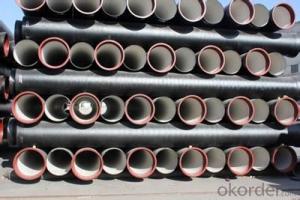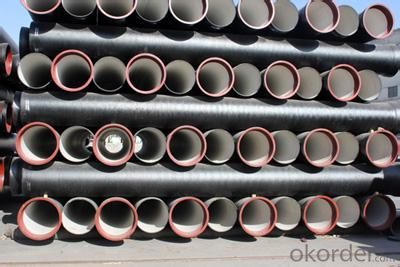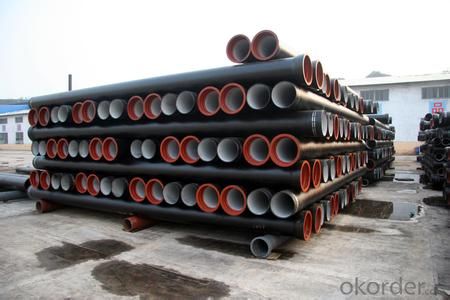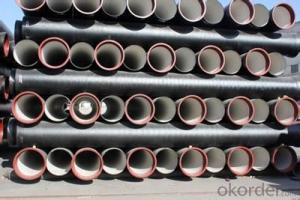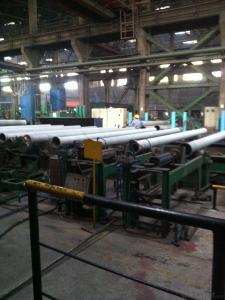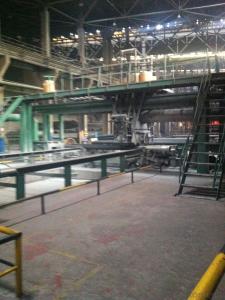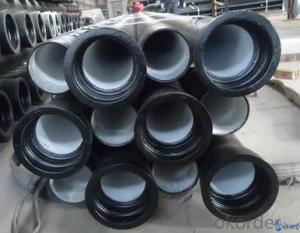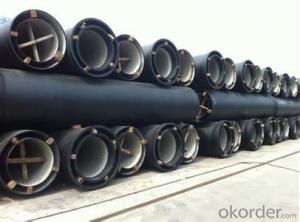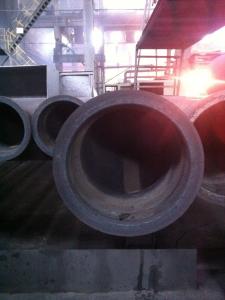DUCTILE IRON PIPES AND PIPE FITTINGS k9 CLASS DN80
- Loading Port:
- Tianjin
- Payment Terms:
- TT OR LC
- Min Order Qty:
- 22 pc
- Supply Capability:
- 3000 pc/month
OKorder Service Pledge
OKorder Financial Service
You Might Also Like
Material : Ductile Cast Iron
Size Range : DN 80mm to DN 2000mm
Unit Effective Length : 6m or 5.7m
Manufacture Standard: ISO 2531:1998/ EN 545:2006/EN 598:2007
Annual capacity : 200,000 tons
Coating Exterior: Zinc 130g/m2 according to ISO 8179-1 and bitumen coating 70 microns.
Cement Interior: Portland Cement/ High Alumina Cement/ Sulphate Resisting Cement Lining according to ISO 4179
Special requirements on external coating and internal lining can be applied
We also provide accessories such as SBR/EPDM rubber gaskets, lubricant paste, pipe caps, PE sleeves, etc.
Additional Parts:
Each pipe is strictly inspected according to related standard to ensure permanently high performance.
Easy Installation at site and service free for life
Long Service Lifespan
Quotation will arrive you within 24hours once we get your inquiry.
We guarantee offering you a competitive price.
A copy of original inspection reports of pipes will be offered after shipment.
Photos of loading process will be sent to the customer after shipment effect.
We will follow-up the delivery progress after shipment effect and update to the customer on weekly basis.
- Q: How are ductile iron pipes protected against mechanical damage?
- Ductile iron pipes are protected against mechanical damage through various measures. One common method is the application of protective coatings on the external surface of the pipe. These coatings, such as epoxy or polyethylene, provide a barrier against abrasion and impact, reducing the risk of mechanical damage. Additionally, ductile iron pipes are often installed with proper bedding and backfill materials, ensuring a stable and supportive environment that minimizes the potential for external forces to cause damage. Furthermore, the pipes can be designed with thicker walls or ribs to enhance their resistance to mechanical stress. Overall, a combination of protective coatings, appropriate installation techniques, and structural design considerations helps safeguard ductile iron pipes against mechanical damage.
- Q: How do ductile iron pipes handle traffic vibrations?
- Ductile iron pipes are highly resistant to traffic vibrations due to their inherent strength and flexibility. These pipes have the ability to absorb and dissipate the energy generated by traffic vibrations, minimizing any potential damage or stress on the pipes. Additionally, their sturdy construction and high tensile strength make them less susceptible to cracking or breaking under the impact of traffic-induced vibrations. Overall, ductile iron pipes provide excellent performance and durability in handling traffic vibrations.
- Q: What is the cost of ductile iron pipes compared to other materials?
- The cost of ductile iron pipes is generally higher compared to other materials such as PVC or HDPE. While the upfront cost may be higher, ductile iron pipes are known for their durability, longevity, and resistance to damage, making them a cost-effective choice in the long run.
- Q: What is the expected noise reduction of ductile iron pipes?
- Several factors can influence the expected noise reduction of ductile iron pipes. These factors include the characteristics of the pipe material and design, the installation method, and the surrounding environment. Generally, ductile iron pipes have been found to offer significant noise reduction compared to other pipe materials. Ductile iron pipes are renowned for their superior acoustic performance, thanks to their dense and robust construction. The material's high density helps absorb and dampen noise vibrations, thus reducing the transmission of sound waves through the pipe. Furthermore, the smooth internal surface of ductile iron pipes minimizes turbulence and friction, contributing further to noise reduction. Numerous studies and field tests have demonstrated that ductile iron pipes can achieve noise reductions ranging from 10 to 20 decibels (dB) or even higher, depending on specific conditions. These noise reductions can greatly enhance the acoustic environment in areas where the pipes are used, such as residential areas, hospitals, or schools. It is important to acknowledge that while ductile iron pipes can provide substantial noise reduction, other factors like pipe connections, fittings, and valves can impact the overall acoustic performance. Proper installation techniques, including the utilization of effective seals and dampers, can further enhance noise reduction. In conclusion, ductile iron pipes are expected to offer significant noise reduction benefits due to their dense construction, smooth internal surface, and efficient installation methods. However, it is crucial to consider the specific requirements of each project and consult professionals to determine the anticipated noise reduction levels based on the particular circumstances.
- Q: Can ductile iron pipe be used for industrial wastewater applications?
- Certainly, industrial wastewater applications can make use of ductile iron pipe. Renowned for its robustness, longevity, and corrosion resistance, ductile iron pipe proves itself suitable for a multitude of purposes, including wastewater systems. Its ability to withstand high pressure and endure demanding conditions renders it perfect for industrial wastewater applications that may involve abrasive or corrosive substances. Furthermore, the installation and maintenance of ductile iron pipe are effortless, resulting in reduced costs and guaranteed long-term dependability. Nevertheless, it remains crucial to carefully scrutinize the unique prerequisites of the wastewater application and seek guidance from professionals to ascertain the most fitting pipe material and design.
- Q: What is the expected corrosion protection system for ductile iron pipes?
- The expected corrosion protection system for ductile iron pipes typically includes a combination of internal and external coatings, such as cement mortar lining and an external polyethylene or epoxy coating. Additionally, sacrificial anode systems or impressed current cathodic protection may be employed to further enhance the corrosion resistance of the pipes.
- Q: Are ductile iron pipes suitable for sewer force mains?
- Sewer force mains can indeed make use of ductile iron pipes. Ductile iron, a variant of cast iron, possesses a higher degree of strength and flexibility in comparison to conventional cast iron pipes. This quality renders it suitable for applications where pipes must endure high pressure and heavy loads, such as sewer force mains. Ductile iron pipes exhibit exceptional resistance against corrosion and boast impressive durability, which proves vital for sewer systems that face exposure to various corrosive substances and challenging environments. Moreover, these pipes possess the ability to absorb vibrations and shocks, thereby reducing the risk of pipe failures caused by external forces. Furthermore, ductile iron pipes possess a renowned reputation for their lengthy service life, frequently extending beyond 100 years. As a result, they constitute a cost-effective choice for sewer force mains, necessitating minimal maintenance and replacement throughout their lifespan. In conclusion, ductile iron pipes offer a dependable and long-lasting solution for sewer force mains, delivering the requisite strength, flexibility, and resistance to corrosion to ensure the efficiency and durability of sewer systems.
- Q: Can ductile iron pipes be used for underground mining applications?
- Underground mining applications can indeed utilize ductile iron pipes. Ductile iron, renowned for its robustness, is capable of enduring the demanding conditions and weighty burdens that mining ventures entail. This material exhibits remarkable resistance to corrosion and possesses the capacity to withstand high-pressure and high-temperature settings. Furthermore, ductile iron pipes offer flexibility, facilitating effortless installation and maintenance, rendering them fitting for underground mining applications that prioritize mobility and adaptability. In summary, ductile iron pipes present a dependable and economical option for underground mining operations.
- Q: What is the external coating used in ductile iron pipes?
- Ductile iron pipes usually have an external coating made of protective materials like zinc or asphalt. These coatings are applied to the pipe's surface to prevent corrosion and shield the iron from its surroundings. Zinc coatings, like hot-dip galvanizing, are widely employed because of their exceptional resistance to corrosion. Conversely, asphalt coatings offer a resilient and adaptable shield against corrosion and abrasion. The selection of the coating relies on factors such as the intended use, environmental circumstances, and project-specific requirements.
- Q: Why is the cast iron tube lined with cement? Under what circumstances are ductile iron pipes lined with cement, and under what circumstances do not have to be lined with cement?
- The cement lining protects the water quality, reduces the head loss and improves the service life of the spheroidal graphite pipe. As long as the water delivery hose is used, the cement lining must be used. There is no lining cement for conveying air.
Send your message to us
DUCTILE IRON PIPES AND PIPE FITTINGS k9 CLASS DN80
- Loading Port:
- Tianjin
- Payment Terms:
- TT OR LC
- Min Order Qty:
- 22 pc
- Supply Capability:
- 3000 pc/month
OKorder Service Pledge
OKorder Financial Service
Similar products
Hot products
Hot Searches
Related keywords
